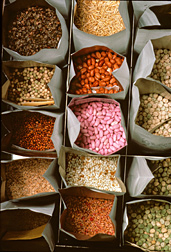This page has been archived and is being provided for reference purposes only. The page is no longer being updated, and therefore, links on the page may be invalid.
ARS Contributes Seeds to Global Storage Vault in Norway
By Kim KaplanJanuary 30, 2008
Seeds from more than 11,000 plant varieties are being shipped by the Agricultural Research Service (ARS) this week to the Svalbard Global Seed Vault in Norway.
The seeds are coming from the collections of the ARS National Plant Germplasm System (NPGS), the United States' system of genebanks for crops and their wild relatives. The ARS National Center for Genetic Resources Preservation (NCGRP) in Fort Collins, Colo., is coordinating the shipment. ARS is the U.S. Department of Agriculture's chief scientific research agency.
Preserving seeds is essential for food and agricultural security, providing the genetic resources used to make crops more nutritious, higher yielding, more tolerant of stress and more resistant to diseases.
This first shipment of seeds from ARS to Svalbard contains 471 crop species, including maize, soybeans, peanuts and sunflowers. Additional shipments are anticipated each year for the next 5-10 years, until most of the germplasm represented in the NPGS collection is also stored at Svalbard.
Preserving genetic resources of crops from around the world is an important part of the ARS mission. The United States strongly supports international efforts to collect, preserve and exchange these resources, explained David Ellis, the NCGRP plant physiologist who is overseeing the project.
The ARS shipment will arrive to be part of the grand opening of the Svalbard Global Seed Vault on February 26, when the first sunlight for 2008 will appear over the arctic night in Svalbard.
The Svalbard Global Seed Vault, a partnership of Norway and the Global Crop Diversity Trust, is designed to store duplicates of seeds from collections from around the globe. If seeds are lost for any reason—natural disasters, war or power failure—the seed collections could be reestablished using seeds from Svalbard.
The NCGRP now stores more than 730,000 separate backup samples of plants comprising more than 6,000 species and 1,000 genera that are important to agriculture and the environment. NCGRP is one of the largest genebank facilities in the world and a pioneer in germplasm storage techniques.
Germplasm from the NPGS is freely distributed for research that supports crop improvement and biological diversity.

